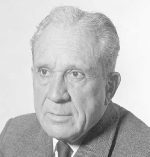From a contemporary press report
Dr. Harvey Hall of The Fairfax Retirement Community, Fort Belvoir, Virginia, died on October 22, 2003 at the age of 99.
Harvey Hall retired in 1973 as chief scientist of NASA’S Manned Space Flight Program (The Apollo Program) a position he considered one of his lesser accomplishments.
Born in Butte, Montana, August 18, 1904, to a frontier physician and a registered nurse, he pursued graduate studies at the University of California, Berkley, receiving the first Ph.D. in quantum physics granted under the tutelage of renowned physicist and later atomic bomb scientist J. Robert Oppenheimer. He taught physics and did basic research at Columbia Univeristy, City College of New York, and New York University before World War II.
During WWII he served on active duty as Commander in the United States Navy (Bureau of Aeronautics) working successfully on radar, antisubmarine warfare, and the concept and deployment of “Toss” bombing, greatly increasing the accuracy of naval and air force bombing.
In 1945, he lead an advanced technical group into Nazi Germany to retrieve scientific data on stealth technology. He subsequentlty received two Citations of Merit from the Department of Navy.
After World War II he relinquished his commission but remained with the Bureau of Aeronautics as Chief Physicist in a failed effort to obtain funding for the development of an earth-orbiting satellite. He also served as special advisor to Chief of Naval Operations on nuclear applications. After two years with RAND Corporation (Chief Nuclear Physicist) and the University of Southern California (Associate Professor of Physics), Dr. Hall returned to the USN in 1951 and was later named Civilian Director of Naval Operations Research, during which time the Polaris submarine was developed with solid propellant fueled rockets utilizing smaller thermo-nuclear weapons during the Cold War.
In 1957 Dr. Hall was appointed Chairman of the Department of Physics at Florida State University but was called by Dr. Edward Teller to join him at the Lawrence Livemore Radiation Laboratories in 1960.
Nasa was formed and with funding available, he returned to Northern Virginia for the third time and became leader of the Large Launch Vehicle Development, coordinating efforts with the famed German Rocket scientist Werhner von Braun. Following the successful moon landing in July 1969 and several subsequent missions he retired as Chief Scientist in 1973. Golf, duplicate bridge, reading and classical music consumed much of his time. He wrote his memoirs History of a Physicist – Joys and Woes finishing it at the age of 95 with remarkable memory for details of earlier events.
He was a life master in bridge, long term member (57 years) of The Army – Navy Country Club, The Cosmos Club, the American Physical Society, and the New York Academy of Science, and other scientific societies and author of numerous scientific articles from 1928 to 1980’s.
He is survived by his wife of 69 years Mary Allen Hall, two sons William Harvey Hall, M.D.; wife Minna Wilson of Oklahoma City, OK, John Howland Hall, M.D. and his wife Jane Weisiger of Greensboro, NC (all of whom graduated from Fairfax High School, Fairfax, VA) and one daughter, attorney Mary Suzanne Hall Mindlin and her husband Rod of Cardiff, CA, eight grandchildren, and nine great-grandchildren. He is to be buried in Arlington National Cemetery. The family request no flowers.
HALL, HARVEY
- CDR US NAVY
- VETERAN SERVICE DATES: 12/15/1942 – 03/19/1958
- DATE OF BIRTH: 08/18/1904
- DATE OF DEATH: 10/22/2003
- DATE OF INTERMENT: 02/06/2004
- BURIED AT: SECTION 5-JJ ROW 19 SITE 5
ARLINGTON NATIONAL CEMETERY
Michael Robert Patterson was born in Arlington and is the son of a former officer of the US Army. So it was no wonder that sooner or later his interests drew him to American history and especially to American military history. Many of his articles can be found on renowned portals like the New York Times, Washingtonpost or Wikipedia.
Reviewed by: Michael Howard

